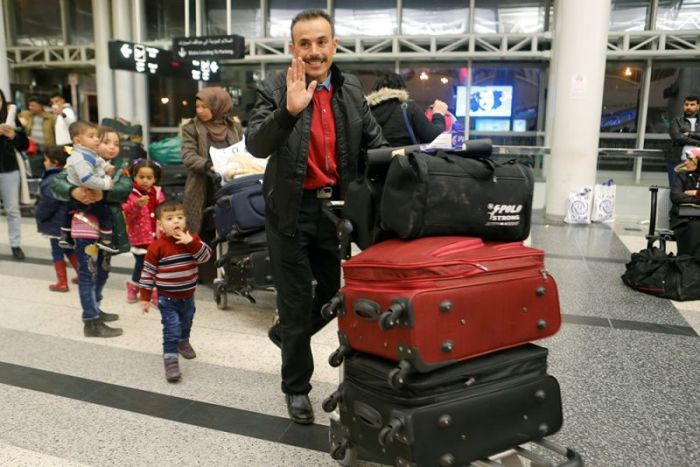Trump's policies destroyed infrastructure Biden needs to raise refugee ceiling to 125,000, advocates say

Former President Donald Trump's cuts to the refugee ceiling will continue to impact resettlement for years as President Joe Biden’s commitment to resettle 125,000 refugees per fiscal year will only be as good as the infrastructure that has been decimated in recent years, advocates said Wednesday.
Representatives from faith-based groups and a national security expert discussed issues facing refugee resettlement in the United States with reporters on a zoom conference organized by the National Immigration Forum.
Trump’s cuts to the number of refugees allowed to be resettled in the U.S. each year to as low as 15,000 refugees for fiscal year 2021 meant that some employees of resettlement organizations lost their jobs, reporters were told.
“As we’re thinking about this from a policy standpoint, this is a problem that is more significant than raising a number," said Southern Baptist Convention’s Ethics & Religious Liberty Commission Vice President for Public Policy, Travis Wussow.
"It’s about rebuilding the pipeline for refugee settlement."
Trump lowered the refugee ceiling to 15,000 people in his final year in office, down from the close to 100,000 refugees resettled in the last full fiscal year of the Obama administration (2016).
Since the 1980s, the U.S. has set ceilings at an average of 95,000 people per year, Bethany Christian Services Vice President of Public and Government Affairs, Nathan Bult, said.
“Until about four years ago, resettling refugees was extremely bipartisan,” said Bult. “The most common question we receive is, ‘is it safe to resettle refugees?’ This is not a process where you simply purchase a plane ticket and you can simply come to the U.S.”
The Trump administration differed from previous Republican and Democrat presidents by cutting refugee numbers, he said.
It cut off funding to refugee resettlement organizations and dismantled the logistical systems required to bring in 95,000 refugees per year.
Aid organizations have struggled to connect families who want to help refugees with people who need help after Trump’s cuts, said World Relief's Church Mobilization Director Matthew Soerens, who is also the national coordinator of the Evangelical Immigration Forum.
“We have lost a lot of infrastructure in the last few years. There’s been a 38% reduction in the number of offices for refugee resettlement since 2017,” he said.
World Relief, the humanitarian arm of the National Association of Evangelicals and one of nine agencies authorized to resettle refugees in the U.S., laid off 140 employees in 2017 after Trump's first refugee ceiling cut.
Because the organization got paid by the government for each refugee it resettled, it received less funding when Trump lowered refugee numbers. In 2019, over 100 offices for refugee resettlement closed or suspended programs.
“Despite an estimated 1.4 million people in urgent need for resettlement worldwide, the U.N. reaches less than 1% of the need,” said Bult. “Now is the time for the U.S. to reassert global leadership.”
To resettle 125,000 refugees in a year, nonprofits and government agencies will have to increase their current rate of resettlement eightfold. They will have to do so before they know how many refugees will want to apply to the U.S., Soerens said.
“It’s great to put a ceiling, but that doesn’t tell us how many refugees will be arriving. The resources historically followed the arrival of the refugees, but we need to build it before they arrive,” he said.
Trump’s refugee policies damaged lives around the world and abdicated America’s place of leadership, said Elizabeth Neumann, the former deputy chief of staff of the Department of Homeland Security under Trump who endorsed Biden in the 2020 election.
“The fearmongering that took place over the last four years was not grounded on any actual threat. A lot of the assertions on why we needed the travel ban were not grounded in reality,” she said. “Tone down the rhetoric. Start dealing in facts. That’s the best way to keep us safe. It’s not to close our doors.”
The travel ban Neumann cited was set in motion by former President Barack Obama, who in December 2015 signed into law the Visa Waiver Improvement Program and Terrorist Travel Prevention Act, which designated Iraq, Iran, Syria, Yemen, Sudan, Libya and Somalia as areas of concern.
The countries affected by the travel ban before Biden’s revoked it last week were Eritrea, Iran, Kyrgyzstan, Libya, Myanmar, Nigeria, North Korea, Somalia, Sudan, Syria, Tanzania, Venezuela, and Yemen.
Trump issued the first version of the travel ban on Jan. 27, 2017. In April 2018, Trump removed Chad from the list of the blocked countries. Last year, he added Eritrea, Kyrgyzstan, Myanmar, Nigeria, Sudan, and Tanzania due to their failure to share “terrorist, criminal, or identity information” for their travelers.
Neumann argued that refugees from war-torn countries don’t pose a higher security threat than Americans who are already in the country. And the refugees who have committed terrorist attacks chose radical beliefs after they arrived in the U.S., she contended.
Advocates said that refugees have to pass through a complex series of logistical obstacles, background checks and bureaucracy before they enter the U.S. Getting into the U.S. can take two years as well as requires a large number of skilled professionals to organize.
Biden’s refugee ceiling sends an important message to the rest of the world, Neumann asserted.
“Setting the ceiling, even if it’s difficult or impossible to achieve this year, it’s sending a signal that we’re back,” she said. "It is my understanding these resettlement agencies domestically will need time and space to step up."




























